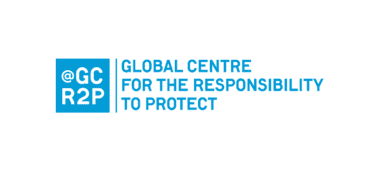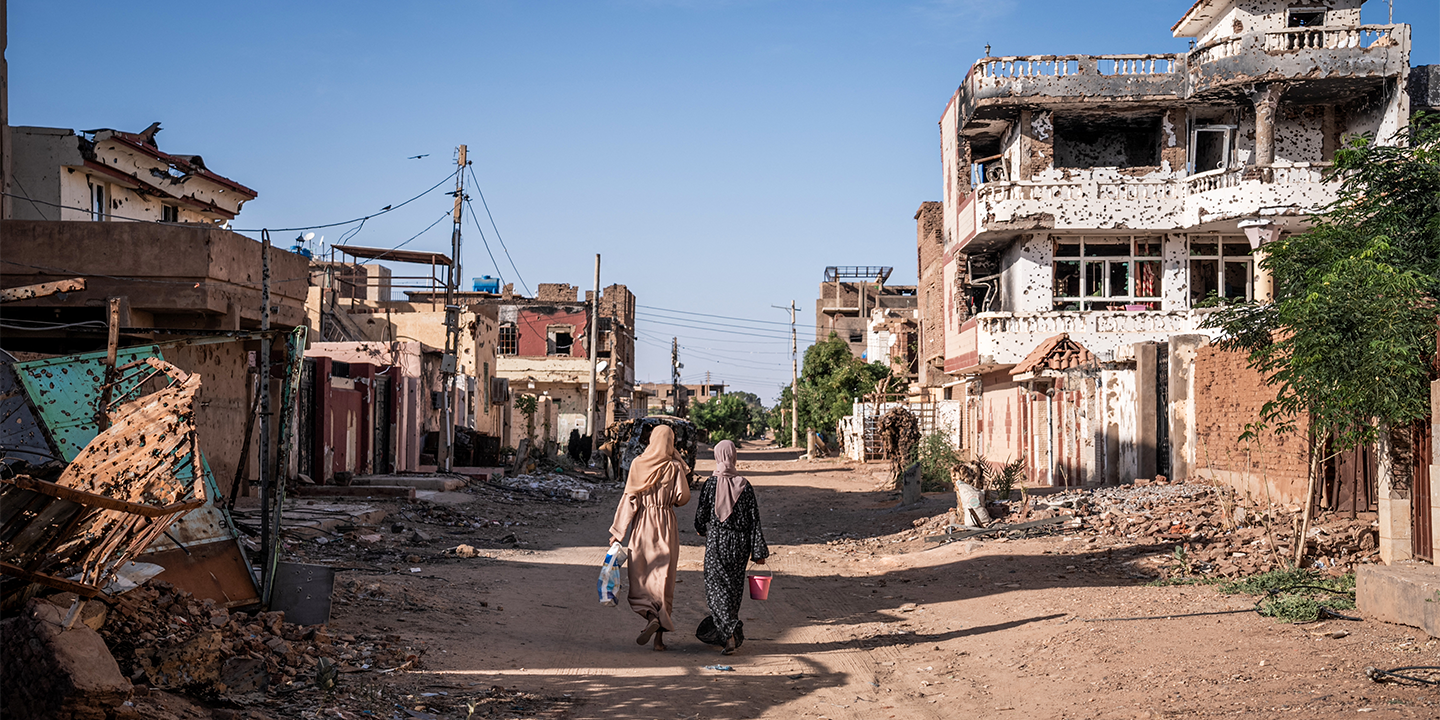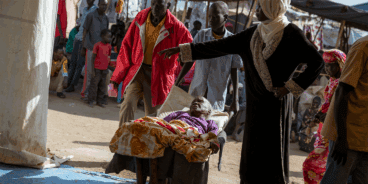

Atrocity Alert No. 445: Sudan, Syria and Eritrea
Atrocity Alert is a weekly publication by the Global Centre for the Responsibility to Protect highlighting situations where populations are at risk of, or are enduring, mass atrocity crimes.
UN WARNS OF CATASTROPHIC SURGE IN VIOLENCE IN SUDAN
Following months of increased mobilization of fighters, including the recruitment of children, the paramilitary Rapid Support Forces (RSF) launched a further attack on 15 June to capture El Fasher, the capital of Sudan’s North Darfur region. According to the Office of the UN High Commissioner for Human Rights, this current ground assault closely resembles the RSF’s April attack on the Zamzam displacement camp, which killed hundreds of civilians, involved widespread sexual violence and deepened an already dire humanitarian catastrophe.
The violence in El Fasher is part of a broader escalation across Sudan. On 17 June, while addressing the UN Human Rights Council, the Independent International Fact-Finding Mission (FFM) for the Sudan raised alarm over the intensifying conflict, marked by the widespread use of heavy weaponry in densely populated areas. Just days later, on 20 June, UN High Commissioner for Human Rights Volker Türk warned of a catastrophic surge in ongoing and escalating hostilities across North Darfur and the Kordofan regions. On 22 June more than 40 people, including children and medical staff, were killed in an attack on Al-Mujlad Hospital in West Kordofan. Both warring parties blamed each other for the strike.
High Commissioner Türk stressed, “We know where further escalation will lead. For too long already, the world has witnessed the unbound horrors unfolding in Sudan and the untold suffering of its people. Civilians must be protected at all costs.”
Atrocity crimes continue unabated, with both the Sudanese Armed Forces (SAF) and the RSF perpetrating widespread and systematic attacks against civilians. Sexual and gender-based violence continues to surge, particularly in RSF-controlled displacement camps. The FFM has documented rape, gang rape, abduction, forced marriage and sexual slavery targeting women and girls. In areas retaken by the SAF – such as Khartoum, Al Jazeera and Sennar – the FFM has documented extensive acts of retaliatory violence between late 2024 and mid-2025.
Fighting has also intensified in South Kordofan, where civilians remain trapped amid ongoing clashes over the strategic town of Al Debibat. The SAF briefly controlled the town on 23 May, but the RSF regained control shortly after. According to the International Organization for Migration, at least 565 families have been displaced by heavy fighting in and around Al Debibat.
The international community, including the UN Security Council (UNSC), African Union and UN member states, must urgently leverage diplomatic efforts, comprehensive sanctions and unequivocal public condemnation to compel the SAF, RSF and allied militias to halt hostilities immediately. The UNSC should consider adopting a robust resolution with concrete measures to protect civilians and prevent further violence. In addition to ceasefire negotiations, the international community must assess the risk of further atrocities, including evaluating which communities are at imminent risk, and coordinate an appropriate protection response.
SUICIDE BOMBING IN CHURCH KILLS DOZENS IN SYRIA
On 22 June at least 25 people were killed and over 60 others injured by a suicide bomb attack at the St. Elias Church in Damascus, Syria. Dozens of worshippers had gathered for mass when a masked suicide bomber entered the church and opened fire before detonating an explosive vest. This marks one of the deadliest attacks on Syria’s Christians in over a decade. The UN Special Envoy for Syria, Geir Pedersen, condemned the attack and called on “all to unite in rejecting terrorism, extremism, incitement and the targeting of any community in Syria.”
Syria’s transitional President, Ahmed al-Sharaa, vowed to bring the perpetrators to justice, reiterating the “importance of solidarity,” amid threats to the country’s “security and stability.” While no group has formally claimed responsibility for the attack, Syria’s Ministry of Interior stated that a fighter affiliated with the so-called Islamic State of Iraq and the Levant (ISIL) was responsible. Following the attack, transitional government forces launched operations to find the perpetrators, announcing on 23 June that several suspects had been taken into custody.
Concerns have grown over the potential reemergence of ISIL due to the security vacuum in Syria following the fall of former President Bashar al-Assad. In late May ISIL claimed its first attack on transitional government forces, using an explosive device on one of their vehicles in southern Syria. In a briefing to the UN Security Council on 17 June, UN Deputy Special Envoy for Syria, Najat Rochdi, warned that Syria “cannot withstand another wave of instability” and cautioned that “ongoing activity by ISIL remains notable.”
The latest incident also follows a rise in sectarian violence in recent months, with hundreds of people, predominantly from the Alawite minority, killed in early March and dozens of members from the Druze minority killed in late April. Violence has also been accompanied by rising divisive rhetoric on social media. In May the UN Commission of Inquiry on the Syrian Arab Republic warned, “The spread of discriminatory incitement and hate speech, including through social media, is fueling violence and risks threatening Syria’s social cohesion.” The same month, an investigative report by the BBC revealed widespread accounts of organized social media disinformation campaigns against minority communities in Syria. A fabricated blasphemous audio recording was attributed to Druze leaders, inciting backlash against the community, while a coordinated online effort to inflame anti-Alawite sentiment – including tens of thousands of posts – was documented.
If not adequately addressed, ongoing attacks against Syria’s minority communities will heighten the risk of further targeted violence, increase atrocity risks and undermine the country’s transitional process. Safeguarding Syria’s pluralism and diversity is essential. The transitional authorities must also take urgent steps to curtail hate speech and incitement to violence against minority communities.
UN HUMAN RIGHTS COUNCIL MUST RENEW ERITREA MANDATE AMID ONGOING ABUSES
On 16 June the UN Human Rights Council (HRC) opened its 59th regular session in Geneva. During the session, the HRC will consider several resolutions to monitor, document and respond to human rights violations globally, including those that may amount to mass atrocity crimes. Among these is the mandate of the UN Special Rapporteur on the situation of human rights in Eritrea – established in 2012 by a coalition of African states. Over the years, successive Special Rapporteurs, including the current mandate holder, Dr. Mohamed Abdelsalam Babiker, as well as a 2016 UN Commission of Inquiry (CoI), have documented grave and ongoing violations that may constitute crimes against humanity.
Despite overwhelming evidence of abuses, the Eritrean government has introduced a draft resolution calling for an end to the Special Rapporteur’s mandate – mirroring a move by Ethiopia in March 2023 that, a few months later, led to the premature termination of the International Commission of Human Rights Experts on Ethiopia while atrocity crimes remained ongoing.
Abuses in Eritrea include sexual and gender-based violence, torture, arbitrary detention and religious persecution. One of the central violations is Eritrea’s ongoing system of compulsory military service. Though officially limited to 18 months, the practice continues indefinitely in many cases and has been described by Special Rapporteur Babiker as a “system of social control and indoctrination,” marked by coercion and widespread abuses. This system has triggered mass displacement, with Eritrea being the tenth-largest country of origin for refugees and asylum seekers globally. According to the UN Refugee Agency, as much as 18 percent of Eritrea’s population has fled the country – the third-highest rate relative to population size worldwide.
In his 16 June statement to the HRC, Special Rapporteur Babiker highlighted the lack of accountability for these violations, stating, “Nearly a decade has passed since the [CoI] concluded that crimes against humanity may have been committed in a context of widespread and systematic human rights violations. Yet, no meaningful progress has been made toward accountability. As detailed in my report, there have been no investigations, no prosecutions, and no truth-seeking processes initiated by the Eritrean authorities.”
The Global Centre for the Responsibility to Protect’s Executive Director, Savita Pawnday, said, “At a time when international human rights norms are increasingly under threat, sustained global scrutiny of these abuses is more vital than ever. HRC member states must vote ‘no’ on the Eritrean draft resolution if brought to a vote and instead support the renewal of the Special Rapporteur’s mandate. Failing to do so risks setting a dangerous precedent – one that abandons victims of atrocity crimes and undermines the very principles the Council was created to uphold. Even if unsuccessful, this move emboldens perpetrators of atrocity crimes worldwide who have repeatedly sought to shield themselves from accountability by weakening Council scrutiny of unfolding crises.”
Related Content


Atrocity Alert No. 462: Sudan, Haiti and Mozambique
